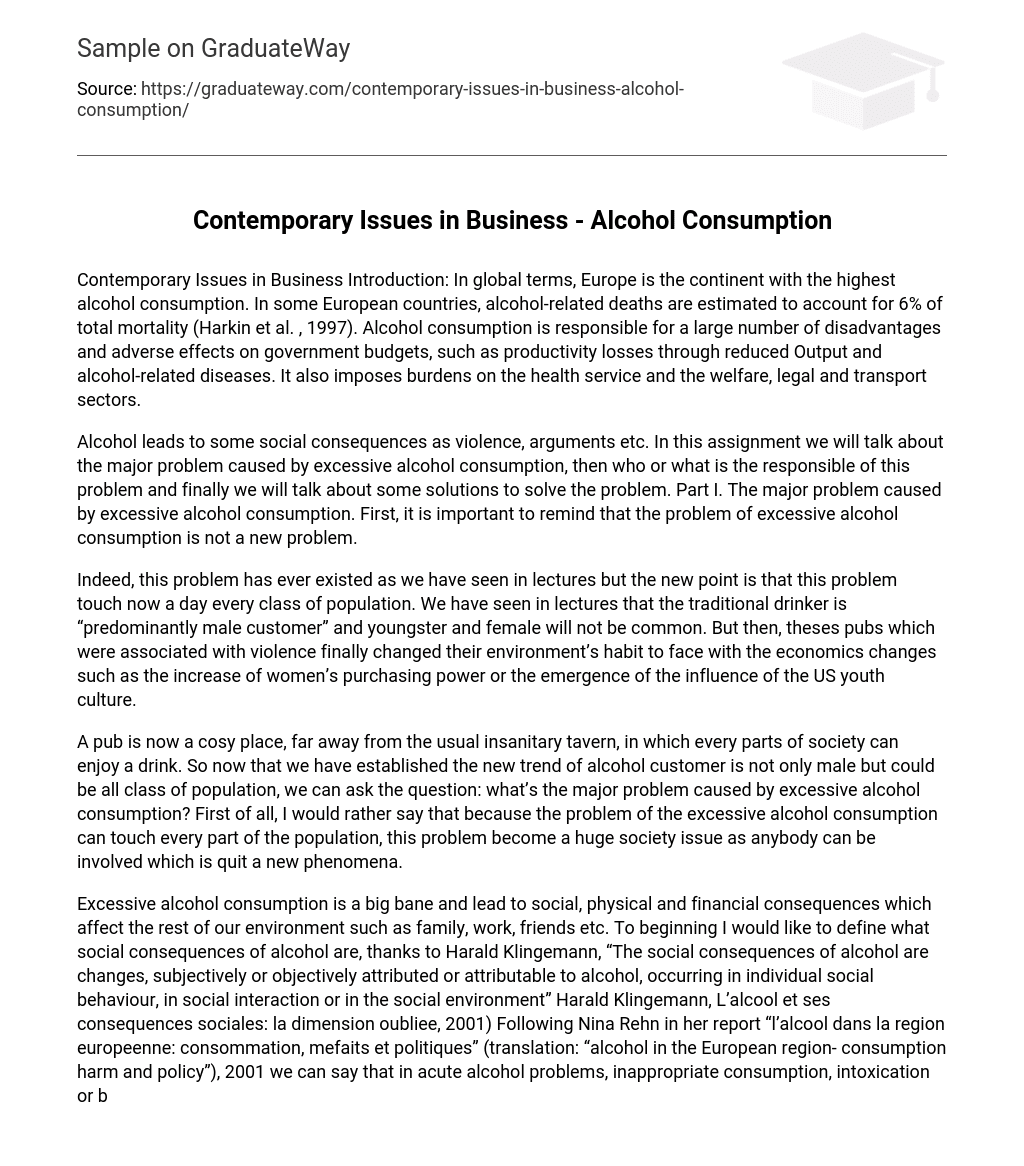In global terms, Europe is the continent with the highest alcohol consumption. In some European countries, alcohol-related deaths are estimated to account for 6% of total mortality (Harkin et al. , 1997). Alcohol consumption is responsible for a large number of disadvantages and adverse effects on government budgets, such as productivity losses through reduced Output and alcohol-related diseases. It also imposes burdens on the health service and the welfare, legal and transport sectors.
Alcohol leads to some social consequences as violence, arguments etc. In this assignment we will talk about the major problem caused by excessive alcohol consumption, then who or what is the responsible of this problem and finally we will talk about some solutions to solve the problem.
The major problem caused by excessive alcohol consumption. First, it is important to remind that the problem of excessive alcohol consumption is not a new problem.
Indeed, this problem has ever existed as we have seen in lectures but the new point is that this problem touch now a day every class of population. We have seen in lectures that the traditional drinker is “predominantly male customer” and youngster and female will not be common. But then, theses pubs which were associated with violence finally changed their environment’s habit to face with the economics changes such as the increase of women’s purchasing power or the emergence of the influence of the US youth culture.
A pub is now a cosy place, far away from the usual insanitary tavern, in which every parts of society can enjoy a drink. So now that we have established the new trend of alcohol customer is not only male but could be all class of population, we can ask the question: what’s the major problem caused by excessive alcohol consumption? First of all, I would rather say that because the problem of the excessive alcohol consumption can touch every part of the population, this problem become a huge society issue as anybody can be involved which is quit a new phenomena.
Excessive alcohol consumption is a big bane and lead to social, physical and financial consequences which affect the rest of our environment such as family, work, friends etc. To beginning I would like to define what social consequences of alcohol are, thanks to Harald Klingemann, “The social consequences of alcohol are changes, subjectively or objectively attributed or attributable to alcohol, occurring in individual social behaviour, in social interaction or in the social environment” Harald Klingemann, L’alcool et ses consequences sociales: la dimension oubliee, 2001) Following Nina Rehn in her report “l’alcool dans la region europeenne: consommation, mefaits et politiques” (translation: “alcohol in the European region- consumption harm and policy”), 2001 we can say that in acute alcohol problems, inappropriate consumption, intoxication or binge drinking can result in drink– driving, poisoning, accidents and violence.
The consumption of alcoholic beverages is estimated to be responsible for some 9% of the total disease burden within the Region, increasing the risk of many medical problems, such as liver cirrhosis, certain cancers, raised blood pressure, stroke and congenital malformations. Furthermore, alcohol consumption increases the risk of family, work and social problems, such as absenteeism, accidents, unintentional injury, violence, homicide and suicide. And finally excessive consumption raise a financial problem since more and more accident are provocated by an alcohol misused. (Nina Rehn, L’alcool dans la Region europeenne : consommation, mefaits et politiques, 2001)
The price of alcoholic drink and consumer purchasing power. Since the 1950’s, alcohol consumption in Great Britain, as in many other countries, has risen substantially because of the operation of factors such as:
- The declining influence of cultural and religious traditions limiting or proscribing alcohol use.
- New patterns of consumption (eg wine with meals) have been added to traditional patterns. Greatly increased availability of alcohol from more outlets, especially off-licenses and supermarkets.
- In relation to consumer purchasing power, alcohol has become much cheaper. (Institute of alcohol studies, Alcohol Problems: causes and prevention, 2001)
In order to minimise the consequences, the government decided to react and has introduce some control, taxes , meeting and promotion about alcohol problems. It has also reduced the number of licenses and tries to fix a minimum price of alcohol. Alcohol excessive consumption is not only a burden for the alcoholic and his/her family but also for the entire society which have to face with a most expensive bill each year.





